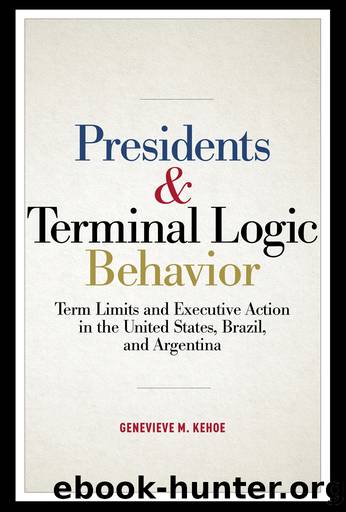Presidents and Terminal Logic Behavior by Kehoe Genevieve M.;

Author:Kehoe, Genevieve M.; [Kehoe, Genevieve M.]
Language: eng
Format: epub
Publisher: Texas A&M University Press
Published: 2014-08-15T00:00:00+00:00
Figure 6.3. Number of cases filed with Brazilâs Supreme Federal Tribunal (1990â2002).
Many times the court could step up and rule against an MPV. It has both the opportunity and the power to do so. Yet the court appears to view this manner of implementing law as constitutional and supported as other forms. In fact, empirical analysis of cases reveals that the court is less likely to issue an injunction against executive decrees than against other forms of laws.51 Kapiszewski (2007) finds that in 22 of the most important cases regarding economic policy, only 4 are MPVs (18 percent of the time).52 The object of cases is more often a complementary or an ordinary law (36 percent of the time) or a constitutional amendment (27 percent of the time). She adds: â[I]t was much more often the content rather than form of policies that was questioned: policy content was questioned in 17 cases (or 65 percent of the time), and both form and content were questioned in 4 cases (or 15 percent of the time)â (ibid., 336). Similarly, using a sample of more than one thousand cases in which the plaintiffs charged direct action of unconstitutionality (ação direta de inconstitucionalidade, or ADIn) against laws passed by the three branches of federal government. Taylor (2006, 175â76) finds that âordinary laws, which require far more deliberation than executive measures, are roughly twice as likely to face successful injunctive challenges as executive decrees. In addition, non-executive decrees by either Congress or the Judiciary are 1.8 times more likely to face successful injunction requests than executive decrees.â53 As a result, he concludes that this âknocks down any assumption that the STF views the use of provisional measures (MPVs) as inherently more arbitrary or less constitutional than the use of other forms of legislationâ (ibid., 179).
Not only is the court less likely to issue a successful injunction against MPVs than other forms of law, but on notable occasions it has flat out refused to grant review of cases associated with them. For instance, in a sweeping display of presidential power President Collor decreed the freezing of Brazilian accounts. Then he made subsequent decrees prohibiting courts from placing injunctions against decrees related to the Collor Plan. The court refused to review petitions associated with any of these decrees (Ballard 1999, 255).
This is not to say that the court does not hear cases questioning executive action. It hears such cases and has âreversed important decisions [made] by powerful presidentsâ (Taylor 2006, 338).54 In Kapiszewskiâs sample, executive action in the form of âsome sort of administrative policy or decisionâ is questioned in 31 percent of the cases. And the court did step in when presidents began to reissue MPVs after they had been disapproved by Congress. The court ended this practice in 1991. Moreover, there are some signs that the court is beginning to change its tune. The court appears to support Temerâs interpretation of EC32, which restricts the application of legislative blockage to ordinary law proposals (Rennó 2010, 219â21).
Download
This site does not store any files on its server. We only index and link to content provided by other sites. Please contact the content providers to delete copyright contents if any and email us, we'll remove relevant links or contents immediately.
The Secret History by Donna Tartt(18232)
The Social Justice Warrior Handbook by Lisa De Pasquale(11963)
Thirteen Reasons Why by Jay Asher(8476)
This Is How You Lose Her by Junot Diaz(6463)
Weapons of Math Destruction by Cathy O'Neil(5855)
Zero to One by Peter Thiel(5508)
Beartown by Fredrik Backman(5372)
The Myth of the Strong Leader by Archie Brown(5250)
The Fire Next Time by James Baldwin(5033)
How Democracies Die by Steven Levitsky & Daniel Ziblatt(4972)
Promise Me, Dad by Joe Biden(4916)
Stone's Rules by Roger Stone(4875)
100 Deadly Skills by Clint Emerson(4700)
A Higher Loyalty: Truth, Lies, and Leadership by James Comey(4567)
Rise and Kill First by Ronen Bergman(4554)
Secrecy World by Jake Bernstein(4407)
The David Icke Guide to the Global Conspiracy (and how to end it) by David Icke(4397)
The Farm by Tom Rob Smith(4332)
The Doomsday Machine by Daniel Ellsberg(4254)
